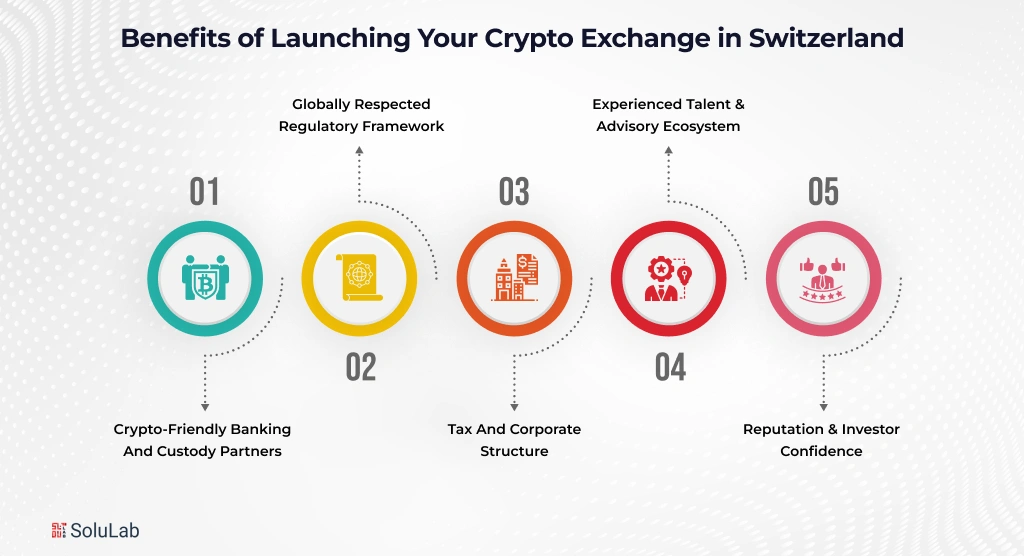
Switzerland has quietly become one of the world’s most attractive places to start a cryptocurrency exchange in Switzerland. Stable politics, a predictable legal framework, deep financial expertise, and the famed “Crypto Valley” in Zug combine to give entrepreneurs runway for launching digital-asset businesses. Market projections show steady growth, with revenue estimates in the hundreds of millions USD and rising retail adoption. This demand, liquidity, and investor interest are all moving in the same direction.
But building the best crypto exchange in Switzerland isn’t just about code or marketing. It’s about blending technical excellence, airtight compliance, and local banking relationships. The following explains why Switzerland matters, and the step-by-step guide to launching a compliant, scalable exchange.
Why Switzerland is the Global Crypto Hub?
Switzerland’s strength as a crypto-friendly jurisdiction is multi-fold:
- Regulatory clarity and stability: FINMA applies existing financial and AML laws to digital assets in a technology-neutral way, which reduces legal ambiguity for entrepreneurs and investors alike.
- Concentrated crypto ecosystem: Crypto Valley (Zug) and Zug-adjacent cantons host startups, experienced advisors, and specialized banks, creating a powerful ecosystem effect.
- Institutional readiness: A growing slate of licensed banks and institutions offer custody, tokenization, and institutional services, which support exchanges that target high-net-worth and corporate clients.
- Market momentum: Forecasts show the Swiss crypto market expanding in revenue and adoption, which makes timing favorable for those who launch a crypto business in Switzerland now rather than later.
Together, these elements make Switzerland an ideal base for launching consumer and institutional crypto products, from retail spot exchanges to tokenization platforms.
Legal Requirements for Starting a Crypto Exchange in Switzerland
If you want to run one of the crypto exchanges in Switzerland, you must design operations around Swiss legal obligations from day one. Let’s delve deeper into it:
1. Entity and Corporate Setup
- Pick a legal form: Stock Corporation (AG) is preferred for exchanges due to capital and governance expectations; GmbH is possible for smaller ventures.
- Minimum capital: AG typically requires CHF 100,000 (with a portion paid in incorporation); GmbH requires CHF 20,000.
- Local presence: At least one Swiss-resident director and a registered office are normally required.
2. FINMA Licensing & SRO Registration
- Activities such as custody, fiat on-ramps, or holding client funds often trigger FINMA oversight or require affiliation with an AML Self-Regulatory Organization (SRO) like VQF.
- Possible license paths include fintech authorization (for certain deposit-taking models), banking licenses (when offering interest or broad custody), securities firm licenses (for tokenized securities), or direct FINMA approval for more complex models.
- Expect submission of a detailed business plan, AML/KYC policies, IT security documentation, technical architecture, and proof of adequate capital.
3. AML/KYC and Recordkeeping
- Swiss AML law applies to VASPs; full KYC, transaction monitoring, suspicious-activity reporting, and annual AML audits are standard requirements.
- Maintain auditable records and use blockchain analytics tools to trace fund flows.
4. Token classification and investor protection
- FINMA classifies tokens by function: payment, utility, asset, or debt, with the strictest rules applied to tokens that resemble securities. Legal classification determines disclosure, prospectus, and licensing obligations.
5. Taxation & accounting
- Crypto assets are treated as movable property; taxation and VAT treatments vary by token type and service. Accurate accounting (mark-to-market valuations, separate ledgers for staking/rewards) and annual audited statements are expected.
Proactive legal planning not only prevents enforcement issues but is also a market differentiator; institutional counterparties will only work with exchanges that demonstrate rigorous compliance.
Benefits of Launching Your Crypto Exchange in Switzerland
Switzerland offers some of the most tangible and reliable advantages for anyone planning to launch a crypto business. Its ecosystem blends regulatory clarity, global credibility, and a sophisticated financial infrastructure that few countries can match.

1. Access to Crypto-Friendly Banking and Custody Partners
Switzerland is home to more than 20 regulated financial institutions, including SEBA Bank, Sygnum, and Arab Bank (Switzerland), that actively support crypto ventures. This rare level of banking access enables smooth fiat on-ramps, secure custody, and instant settlements between banks and exchanges, reducing operational friction from day one.
2. Globally Respected Regulatory Framework
The FINMA licensing system is recognized worldwide for its transparency and precision. Over 1,000 blockchain and fintech firms operate legally under FINMA or SRO oversight. A Swiss license instantly signals trust and helps exchanges collaborate with institutional investors, liquidity providers, and global payment partners.
3. Attractive Tax and Corporate Structure
With corporate tax rates ranging between 11.8% in Zug and 21% in Geneva, Switzerland remains one of the most tax-efficient hubs in Europe. Over 80 double taxation treaties (DTAs) simplify cross-border operations, while IP-box regimes lower taxes on software and technology assets, letting startups reinvest more into innovation and growth.
4. Experienced Talent and Advisory Ecosystem
The Crypto Valley region alone hosts 1,200+ blockchain companies and more than 6,000 professionals, spanning developers, auditors, and compliance experts. This ecosystem offers founders direct access to specialized advisors, law firms, and development partners well-versed in FINMA standards and crypto infrastructure.
5. Reputation and Investor Confidence
Operating from Switzerland instantly enhances credibility. A Swiss-registered exchange conveys reliability, security, and sound governance, values synonymous with the country’s financial legacy. This reputation helps attract both retail users and institutional investors, making market entry and scaling far smoother.
Step-by-Step Process to Launch a Crypto Exchange in Switzerland
Launching a crypto exchange in Switzerland is a structured process because the country offers one of the world’s strongest regulatory, banking, and crypto-friendly environments. Here’s how the journey typically unfolds:
1. Define your business model
Decide whether you build a centralized exchange (CEX), a decentralized exchange (DEX) with a Swiss legal wrapper, or a hybrid. Identify products, spot trading, derivatives, custody, staking, or tokenized assets.
2. Incorporate and structure capital
Form an AG or GmbH, depending on scale. Secure the minimum paid-in capital and appoint a Swiss-resident director.
3. Legal & compliance design
Engage Swiss counsel to classify tokens, draft a compliant AML/KYC framework, and prepare FINMA/SRO filings. Prepare business plans and financial projections required for licensing.
4. Build secure, scalable technology
Develop or license a trading engine capable of high throughput, implement multi-layer security (cold storage, HSMs, 2FA, anti-DDoS), and integrate liquidity APIs. Ensure architecture supports real-time reconciliation and audit trails.
5. Bank and payment integrations
Partner with crypto-friendly banks in Switzerland to enable fiat on/off ramps, settlement, and treasury services. Establish custody arrangements or integrate with licensed custodians.
6. Audit, testing & independent reviews
Conduct smart contract and platform security audits, penetration testing, and performance benchmarks. Document results for regulators and partners.
7. Licensing / Registration
Submit FINMA or SRO applications, respond to queries, and satisfy any capital or governance conditions. Typical review cycles vary; thorough documentation accelerates approval.
8. Launch & ongoing operations
Roll out KYC flow, liquidity provisioning, market-making, and customer support. Maintain continuous compliance: AML monitoring, periodic audits, and regulatory reporting.
9. Post-launch scaling
Invest in UX, mobile apps, advanced order types, and additional markets (tokenized securities, institutional desks). Keep iterating on security and compliance posture.
Many entrepreneurs engage a specialized partner for the technical and compliance lift. For example, a local development firm with FINMA experience can accelerate time-to-market while embedding regulatory controls into the product.
What’s Next for Crypto Exchange Entrepreneurs in Switzerland?
Looking forward, Swiss exchanges that combine regulatory-first governance, institutional-grade security, and product innovation will have the strongest competitive advantage. Key future trends to monitor:
- Tokenization and RWAs: growing demand for tokenized real estate and fund shares will create new trading venues.
- DeFi/CeFi convergence: regulated gateways to decentralized liquidity and custody solutions will become a differentiator.
- Institutional onboarding: exchanges with clear compliance and custody setups will capture institutional order flow.
- Tech evolution: AI-driven risk controls, advanced analytics, and improved UX will push user expectations higher.
- Regulatory harmonization: potential alignment with EU frameworks (e.g., MiCA-like standards) could simplify cross-border expansion.
If you plan to launch a crypto business in Switzerland today, prioritize compliance and security from day one, choose partners who understand FINMA obligations and Swiss banking nuances, and scale design. With the right foundations, Switzerland offers not just permission to operate, it offers a platform to become a trusted, long-term market participant in a maturing global crypto economy.
Conclusion
Through this blog, you might have understood how Switzerland’s regulatory clarity, advanced banking infrastructure, and growing crypto ecosystem. These make it the ideal destination for launching a compliant exchange.
If you’re planning to start a cryptocurrency exchange in Switzerland, ensure your strategy aligns with FINMA’s framework and robust security standards.
We at SoluLab, a top cryptocurrency exchange development company, help businesses build and launch scalable, regulation-ready crypto exchange platforms. We tailor to the Swiss and international markets. Our expert team specializes in end-to-end development. From secure wallet integration and liquidity management to advanced trading engines and AML/KYC compliance.
If you’re ready to launch your crypto business in Switzerland, contact us today.
FAQs
1. How much does it cost to start a cryptocurrency exchange in Switzerland?
The cost depends on your license type, platform complexity, and compliance needs. On average, setup costs range between CHF 150,000 to CHF 500,000, including legal, technical, and operational expenses.
2. How long does it take to obtain a crypto license in Switzerland?
Typically, FINMA licensing or SRO registration takes 3 to 6 months, depending on documentation, business model complexity, and AML readiness. Proper preparation and expert guidance can significantly shorten this process.
3. Which banks in Switzerland are crypto-friendly?
Some well-known crypto-friendly banks in Switzerland include SEBA Bank, Sygnum, Arab Bank (Switzerland), and Maerki Baumann. These banks support fiat on/off ramps, custody services, and digital-asset businesses.
4. Why choose SoluLab to build your crypto exchange?
SoluLab specializes in cryptocurrency exchange development with a regulatory-first design. Our team builds secure, high-speed, and FINMA-ready platforms, combining blockchain innovation, AML automation, and seamless user experiences for global scalability.
5. What makes Switzerland a top choice for crypto companies?
Switzerland offers clear crypto laws, low taxes, strong investor trust, and access to regulated financial institutions. Its ecosystem, led by Crypto Valley, enables safe, compliant, and scalable crypto exchange growth.





